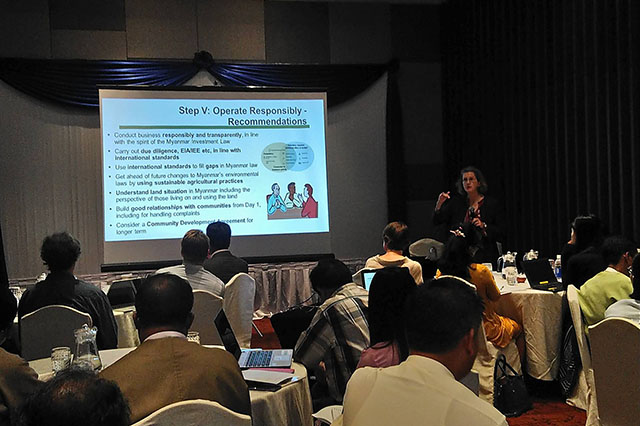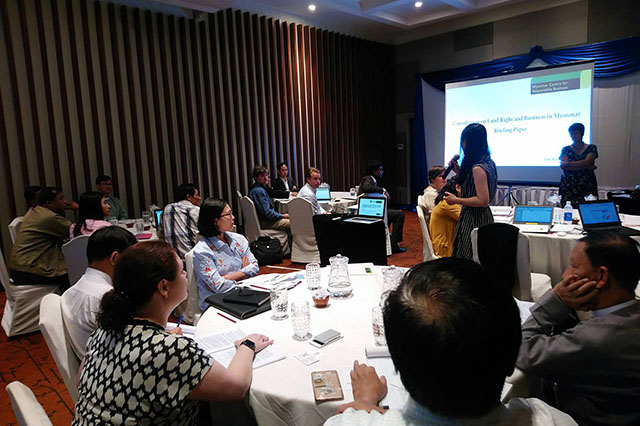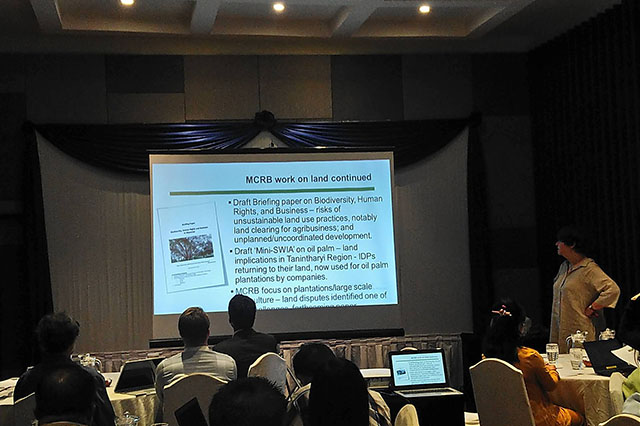Consultation to update MCRB’s Land Rights and Business in Myanmar Briefing Paper

On 22nd May 2018, MCRB held a consultation in Yangon to obtain comments on the draft ‘Land Rights and Business in Myanmar’ briefing paper, an update of MCRB’s 2015 Land briefing paper. The presentations are available here. Reference was also made to the separate forthcoming paper on responsible investment and laws relating to agriculture plantations and land, which MCRB is coauthoring with Oxfam.
The consultation was attended by around 30 people, including officials from Directorate of Investment and Company Administration(DICA), Land Survey Department (MONREC), Department of Agricultural Land Management and Statistics (DALMS), Myanmar National Human Rights Commission, law firms, NGOs, CSOs and independent consultants working on land rights issues in Myanmar.
In addition to support for the main elements of the paper, a number of cases and experiences were shared by participants who noted that:
-
Land remained one of the most challenging issues for investors in Myanmar. Many companies gave up in view of the uncertainty around land ownership and unquantified liabilities due to land acquisition legacies.
-
Disputes arise when compensation is paid to land users rather than those with title, or vice versa.
-
Investors find it difficult to obtain reliable information on land ownership, including who are the original land owners.
-
There is no unified cadaster, although one of the working groups under the new National Land Use Council is focussed on ‘OneMap’.
-
The role of regional government in allocating and permitting land is not clear. There is a tendency to ‘ping-pong’ responsibility for decision-making on land between government departments and at Union/Regional level, as has been seen in the case of the oil palm sector.
-
It will be difficult to obtain clarity over issues like customary tenure by amending existing land laws – as is currently under way in Parliament – rather than first adopting an over-arching Land Rights law as envisaged in the National Land Use Policy
-
Customary land use is currently being interpreted in two different ways: informal use of lowland areas e.g. for pasture; and traditional or customary use in upland areas by ethnic minorities. While the former type is increasingly recognised as a right that needs to be compensated, the government and lawmakers are ducking the issues related to upland customary land use systems, citing the peace process as an excuse.
-
The Myanmar Government signed and ratified the International Covenant on Economic, Social and Cultural Rights (ICESCR) in 2017. This means that Myanmar law needs to be aligned with the Covenant and protect ESC rights. Currently a number of Myanmar land laws, and amendments to those laws (e.g. Virgin Vacant and Fallow (VFV) Land Law, draft law to replace the 1894 Land Acquisition Act are not compliant with Myanmar’s ICESCR obligations. Businesses also have a responsibility to respect these rights.
-
Reallocation of land surrendered to or reacquired by government is currently being trialled in Tanintharyi, but the process is unclear.
-
It is debatable whether large scale land acquisition can ever be ‘responsible’, although this depends somewhat on the nature and occupation of the land.
MCRB welcomes feedback on the draft Land Rights and Business in Myanmar briefing paper before June 30 2018. Please send your comments to and
Read also
- Business Consultation on National Land Law Reform
- MCRB Expresses Concern About the Impact on Responsible Investment of the Amendments to the Virgin, Vacant and Fallow Lands Law
- MCRB submits comments to Parliament on the draft Land Acquisition Act
- Voluntary Guidelines on the Responsible Governance of Tenure (VGGT) of Land, Fisheries and Forests
- MCRB/OXFAM workshop on Responsible investment in plantation agriculture, with a focus on land
 English
English မြန်မာ
မြန်မာ မြန်မာ (unicode)
မြန်မာ (unicode)










